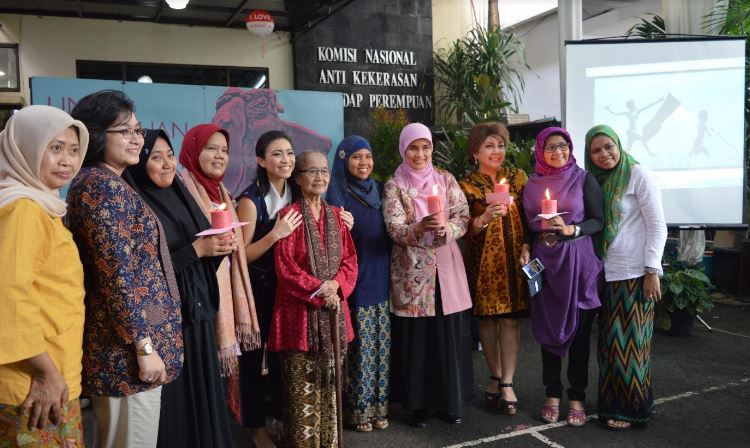Indonesia is currently in the midst of a sexual violence crisis. As noted by Komnas Perempuan (National Commission on Violence Against Women), the instances of violence against women continues to rise from year to year. In 2015 the total reported cases of violence against women reached an all-time high of 321,712 with a large percentage of those cases constituting sexual violence.
Indonesia is by no means a homogenous country and the forms of violence against women that plagues its society are as diverse as the broad archipelago itself. From canings carried out by Sharia police in the Western-most province of Aceh to violence suffered at the hands of the armed forces in Papua, the types of violence faced by the women of Indonesia are numerous and widespread.
A culture of sexual violence is pervasive across Indonesia and its institutions. Virginity testing for female recruits is still practiced by the armed forces and police and female circumcision remains a norm amongst various cultural groups. Child marriage is widespread and polygamous marriages continue to violate women’s rights. Sexual assault and rape is a daily occurrence with victims facing stigmatization, criminalization and a lack of access to justice.
It is clear that major changes need to occur.
A potential catalyst for the beginnings of this change is the Elimination of Sexual Violence Bill, currently waiting to be discussed in the People’s Representative Council (DPR).
The Elimination of Sexual Violence Bill, which entered into the National Legislation Program of 2016 has been drafted in cooperation with Komnas Perempuan along with the Service Provider Forum (FPL).
In simple terms the Bill clearly defines the different forms of sexual violence and sets out the responsibilities of the State in dealing with cases of sexual violence. The Bill provides for the protection of victims and witnesses, increased access to justice, recovery and reparation mechanisms for the victim and rehabilitation of the offender.
On October 14, Komnas Perempuan hosted a public consultation regarding the Bill. The audience heard from an array of speakers about the shortcomings of the current law in protecting victims of sexual violence and their hopes for a new, comprehensive law.
Speakers included staff of Komnas Perempuan, counsellors specializing in sexual violence, human rights lawyers, Islamic scholars and an inspiring survivor of the 1965 killings. Two female members of the DPR, Rahayu Saraswati from the Gerinda Party and Amy Amalin from the National Mandate Party (PAN) were also in attendance, lending their full support to the bill and voicing their commitment to be at the forefront of pushing for its ratification in the DPR.
The ratification of the Bill would act to update the current archaic laws on sexual violence (which were drafted over 100 years ago in colonial times) and bring about more comprehensive legal protections and recovery mechanisms for victims.
Under current Indonesian Criminal Code (KUHP), broadly speaking, there are only two forms of sexual violence that are recognized, namely rape and molestation. The crime of rape in the KUHP as it stands is extremely narrowly defined and limited to vaginal intercourse. This does not reflect current internationally accepted definitions and acts to deny thousands of rape victims their rights of access to justice.
The new Elimination of Sexual Violence Bill is much broader in its scope and includes nine distinct forms of sexual violence. The forms include: sexual assault, sexual exploitation, forced prostitution, sexual torture and a more comprehensive definition of rape.
Sentencing options have also been broadened to include provisions for the reformation and rehabilitation of the offender. Community service, removal of the right to practice a profession and removal of office for public officials are also stated sentencing options that will operate alongside traditional punishments.
In terms of protection of children, for cases of sexual violence that occur in the domestic setting there is a provision to terminate parental rights that will help to keep children safe from chronic abuse.
The progressive new Bill clearly defines the State’s responsibilities in handling cases of sexual violence. It will act to give the victim greater access to and certainty of justice and freedom from stigmatization and criminalization through the legal process.
The Elimination of Sexual Violence Bill is only one step out of many that needs to be taken in order to combat the current sexual violence crisis confronting Indonesia. However, the Bill is a carefully designed, solid and comprehensive piece of proposed legislation. Its ratification will act to demonstrate to the Indonesian public the government’s sincerity and dedication to upholding human rights and eradicating sexual violence.
The author is a current volunteer with Komnas Perempuan in Jakarta. The views expressed in this article are those of the author and do not necessarily reflect the official position of Komnas Perempuan. Reproduction is authorised provided the source is acknowledged. For enquiries contact: jackbritton@live.com.au or jackbritton@support.komnasperempuan.go.id




